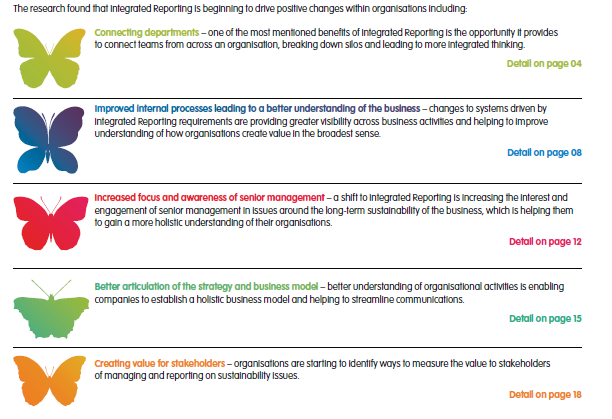 How do we engage within our own internal organizational communities to shifting attitudes and think in different, more responsible ways? How do we communicate our sense of purpose to the outside world? How do we integrate all the activities we are (or should be) undertaking as responsible leaders?
How do we engage within our own internal organizational communities to shifting attitudes and think in different, more responsible ways? How do we communicate our sense of purpose to the outside world? How do we integrate all the activities we are (or should be) undertaking as responsible leaders?
Are we working towards understanding the material sustainability issues better and linking them to financial drivers and where we fit within these complex issues?
There is such an increasing need to develop or simply updating our business language to build stronger cases for change, improvement and broader community engagement but these still seem to be missing.
How are organizations aligning their organizations not just with their own strategies but those in the wider world that contribute into a more sustaining future? We are needing to answer a fair few of these questions in my opinion.
The lack of engagement, of common understanding
Within each corporation there is this overwhelming need and growing concern to engage, to engage our employees, provide them a clearer sense of purpose and offer a better understanding of what a ‘higher’ purpose they are working towards looks like in their language not just through the eyes of the corporate board.
How does the external world perceive us, how do we attract new investment, greater stakeholder engagement. How can we achieve this in better ways than we are doing today?
Many of those traditional measures of purpose left over from the 20th century are simply not working. The social contract between employer, employee and their communities has broken down and this ‘sense of drift’ is certainly making it far more difficult to galvanize each part of the renewing growth equation – including government – to fix it, to be part of a common united sense of solution that connect and resonate across all ‘vested’ parties.
The Integrated Reporting movement (www.theiirc.org )
I’m not sure how aware we all are on the work being undertaken under the auspices of the integrated reporting movement . This is a process that results in changing the communication mechanisms provided by an organization, most visibly a periodic integrated report, about value creation over time.
An integrated report is a concise communication about how an organization’s strategy, governance, performance and prospects, in the context of its external environment, lead to the creation of value over the short, medium and long-term.
Arguable much of the change to achieve Integrated Reporting needs to be driven by companies themselves and the development of the IIRC framework is enabling companies to shape the process based on their own experiences.
A useful starting place to pick up on this
A useful report to initially read is ‘Understanding transformation: Building the business case for Integrated Reporting’ that set out to understand the processes that companies go through as they move towards Integrated Reporting. The organisations participating in the research are at different stages but all are involved in the IIRC’s Pilot Programme, which aims to help develop an International Integrated Reporting Framework

The work being presently undertaken
Over 100 global businesses and 50 institutional investors are directly involved in the IIRC’s work. This includes some of the world’s most iconic brands, such as Coca-Cola, Clorox, Microsoft, Hyundai, Tata, Unilever, Marks and Spencer, SAP and National Australia Bank.
Their engagement within the Pilot Programme are trialling the principles, content and practicalities of the Framework for two years to provide feedback and build business momentum towards its implementation.
By tracking their experiences over the two-year duration of the pilot, the aim is to capture the changes and benefits of adopting Integrated Reporting. This will help to build the business case for a wider shift towards Integrated Reporting and help to generate support among key stakeholders, including internal audiences, boards, investors and regulators.
The business and investor benefits of <IR> are seemingly compelling.
According to latest reports, the empirical evidence from the IIRC Pilot Programme shows that enables the articulation of strategy and how the business is creating value over time.
This information potentially provides the new lifeblood of capital markets. enables a better communication of the material factors that create value over the short, medium and long term. It works towards investor decision-making and the efficient allocation of capital, essential aspects needed for us all to understand.
The next step of a Consultation Draft of the International <IR> Framework
According the website after a successful three months of engagement and the launching the Consultation Draft of the International Framework at events in 10 of the world’s largest capital markets, extensive consultation has taken place with organizations across the world.
From South Korea to Sweden, Italy to Indonesia, and the Netherlands to New Zealand people have evaluated and commenting on the Consultation Draft.
The IIRC are using received submissions to shape the Framework which will be published in December 2013.
We certainly require more integrated thinking for us to all gain this greater sense of identity.
If we can achieve a means of presenting the material about the organization’s strategy, governance and performance on commercial, social and environmental issues then this is a significant step forward. By the ability to effectively connect these often siloed areas, businesses are able to provide not only an update on past performance but also a long-term perspective of future value generation.
Integrated Reporting is, therefore, potentially moving us to good, or at least, better reporting. It provides and equips companies to manage their operations, brand and reputation strategically and to manage better any risks that may compromise the long-term sustainability of the business.
If this initiative does allow organizations to present their material information about the organization’s strategy, governance and performance on commercial, social and environmental issues in an integrated fashion
Regaining engagement through in integrated reporting will benefit many.
I think this collaborative work can potentially advance some of the important areas we need, to regain the engagement within communities. Of course this integrated reporting will have far more initial value to the financial markets and direct investors but if we can begin to see a better, cohesive, articulated business story provided by organizations then it can begin to ‘flow through’ in many different ways.
Beyond the financial community, I think we can all gain by understand the specific business models better, we can begin to appreciate the assets that make up value creation far more and these will be far more based around the intellectual capital assets within organizations and we will begin to gain a higher sense of where innovation is contributing within this integrated reporting.
The value for us all is to become engaged in this work
I think this is a body of work that is well worth exploring and keeping engaged with, it may be a good catalyst for changing our thinking and attitudes and partly help us move finally away from antiquated reporting based on the last century and reporting on assets that are extremely limited on what is making up the real worth of one organization over another.
It is certainly about time that reporting within organizations became significantly better to understand where the real value creation is derived.
If the IIRC can offer a better integrated framework for reporting, something that offers a more cohesive reporting structure that is sadly lacking today, thirteen years into a new century, then we can all benefit from this better understanding.
We can then revise our views on the value and appreciation of what makes up the organization for its value creation – past, present and future – and then decide accordingly, if it has real worth or not going forward, from each of our unique stakeholder perspectives.
1 thought on “Shifting attitudes, think responsibly.”
Comments are closed.